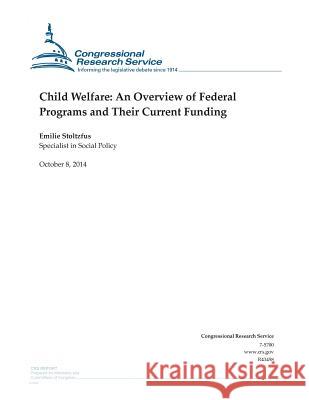Child Welfare: An Overview of Federal Programs and Their Current Funding » książka
Child Welfare: An Overview of Federal Programs and Their Current Funding
ISBN-13: 9781502914774 / Angielski / Miękka / 2014 / 38 str.
Child Welfare: An Overview of Federal Programs and Their Current Funding
ISBN-13: 9781502914774 / Angielski / Miękka / 2014 / 38 str.
(netto: 75,62 VAT: 5%)
Najniższa cena z 30 dni: 79,18
ok. 16-18 dni roboczych.
Darmowa dostawa!
Child welfare services are intended to prevent the abuse or neglect of children; ensure that children have safe, permanent homes; and promote the well-being of children and their families. As the U.S. Constitution has been interpreted, states bear the primary responsibility for ensuring the welfare of children and their families. In recent years, Congress has appropriated just above or below $8 billion in federal support dedicated to child welfare purposes. Most of those dollars (97%-98%) were provided to state, tribal, or territorial child welfare agencies (via formula grants or as federal reimbursement for a part of all eligible program costs). Federal involvement in state administration of child welfare activities is primarily tied to this financial assistance. The remaining federal dollars dedicated to child welfare purposes are provided, primarily on a competitive basis, to a variety of eligible entities to support research, evaluation, technical assistance, and demonstration projects to expand knowledge and improve child welfare practice and policy. At the federal level, child welfare programs are primarily administered by the Children's Bureau, which is an agency within the Administration for Children and Families (ACF) at the U.S. Department of Health and Human Services (HHS). However, three competitive grant programs (authorized by the Victims of Child Abuse Act) are administered by the Office of Justice Programs (OJP) within the Department of Justice (DOJ). Child welfare support is provided via multiple federal programs. Title IV-B of the Social Security Act authorizes funding to states, territories, and tribes for a broad range of child welfare-related services to children and their families. Title IV-E of the Social Security Act entitles states to federal reimbursement for a part of the cost of providing foster care, adoption assistance, and (in states electing to provide this kind of support) kinship guardianship assistance on behalf of each child who meets federal eligibility criteria. Title IV-E also authorizes capped entitlement funding to states (and some discretionary funds as well) for provision of services to youth who "age out" of foster care, or are expected to age out without placement in a permanent family. Legislation concerning programs authorized in Title IV-B and Title IV-E, which represents the very large majority of federal child welfare dollars, is handled in Congress by the House Committee on Ways and Means and the Senate Finance Committee.
Zawartość książki może nie spełniać oczekiwań – reklamacje nie obejmują treści, która mogła nie być redakcyjnie ani merytorycznie opracowana.











